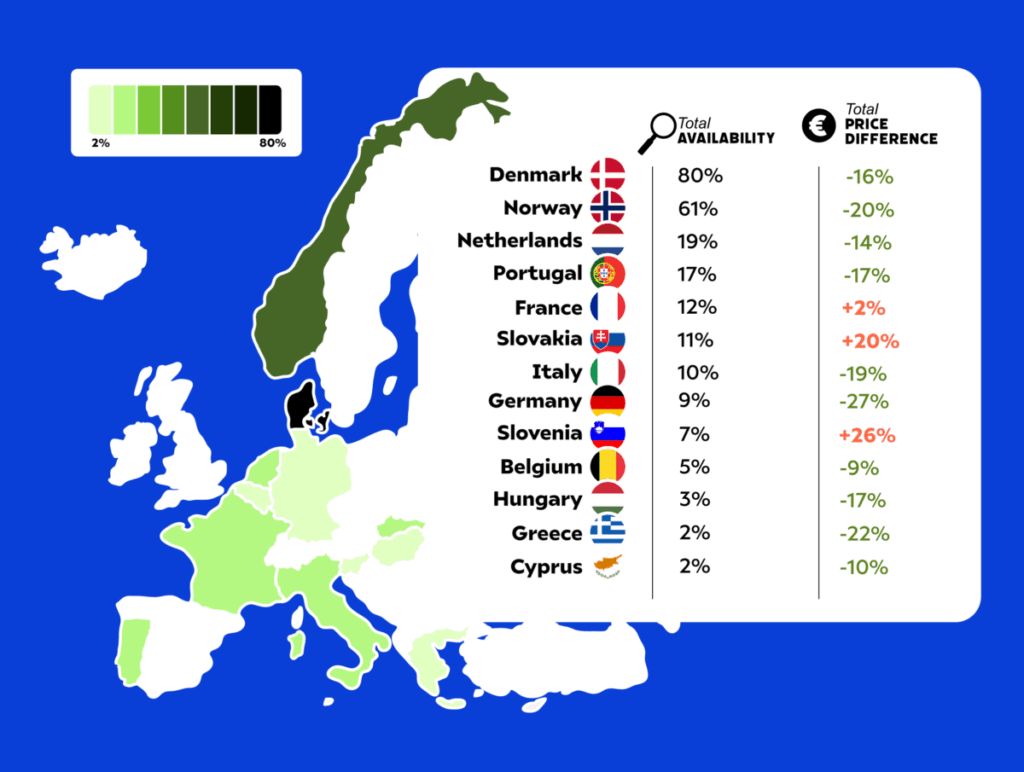Cheaper but hard to find: new report shows unequal access to ecolabelled products in Europe
Buying ecolabelled products is convenient, but not everyone has the same access to them, shows a new report published today by the European Consumer Organisation (BEUC) and the European Environmental Bureau (EEB).
Researchers checked supermarkets in 13 European countries [1] to assess the availability and price of products carrying the EU Ecolabel [2] and three equivalent national and regional labels [3]. These certifications guarantee products with lower environmental and health impacts through their whole life cycle – from design and manufacturing to use, recycling and disposal.
The snapshot survey reveals striking differences across Europe:
- Affordability: in most countries, ecolabelled products are between 9% and 27% cheaper on average than their conventional counterparts [4].
- Availability: access to ecolabelled products varies enormously across countries – from 80% of products carrying an ecolabel in Denmark, to just 2% in Cyprus in Greece. Overall, buying sustainable products is much easier in Scandinavia than elsewhere.
Miriam Thiemann, Policy Officer for Sustainable Consumption at the EEB and BEUC, said:
“Supermarkets play a key role in ensuring ecolabelled products are available, visible, and affordable to consumers. It’s time for retailers to step up and make the sustainable choice the easy choice everywhere in Europe.”
Data show consumers wish to shop sustainably, but face significant obstacles. Rampant greenwashing confuses consumers and decreases their trust in green claims. Three out of four products on the EU market carry a green claim, but more than half are misleading, unsubstantiated or inaccurate, according to the European Commission. Against this backdrop, robust certifications such as the EU Ecolabel play a vital role in helping consumers identify the healthiest and most sustainable products at a glance.
The report also comes as EU policymakers debate the future of the Green Claims Directive – a law designed to tackle greenwashing by setting strict rules for companies to substantiate and communicate their environmental claims. Amid a growing deregulatory push, negotiations have stalled, jeopardising two years of progress and fuelling concerns that the law could be gutted or scrapped altogether.

Notes
[1] The Mystery Shopping test was conducted in Belgium, Cyprus, Denmark, France, Germany, Greece, Hungary, Italy, the Netherlands, Norway, Portugal, Slovakia, and Slovenia. The research focused on the following products: toilet paper, body lotions, nappies, and all-purpose cleaners.
[2] The EU Ecolabel is the EU-wide voluntary sustainability label for non-food products and services, managed by the European Commission and Member States. Established in 1992, the EU Ecolabel has more than 30 years of experience in rewarding frontrunner companies for their best-in-class products. It sets strict environmental and health requirements for all stages of the product life cycle, in collaboration with environmental and consumer organisations. Consumers can find it on a wide range of goods and services, from detergents and paints to paper products, textiles, cosmetics, and even hotels and camping sites.
[3] Alongside the EU Ecolabel, the labels considered were the Scandinavian Nordic Swan, the German Blue Angel, and the Austrian Ecolabel.
[4] In Belgium, Cyprus, Denmark, Germany, Greece, Hungary, Italy, the Netherlands, Norway and Portugal, ecolabelled products are between 9% to 27% cheaper on average than their non-ecolabelled counterparts. In France, there is almost no difference. Only in Slovenia and Slovakia, consumers have to pay considerably more for the greener choice. When prices are competitive, it is often because the supermarket has certified its own-brand product with an ecolabel and offers it at a low price.
Photo by DECO, the Portuguese Association for Consumer Protection.

